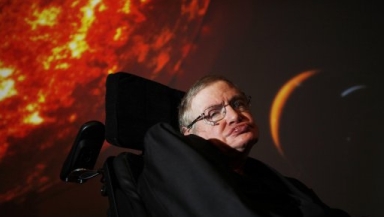
Famed physicist Stephen Hawking made an ominous statement in the foreword of the upcoming book, "Starmus: 50 Years of Man in Space."
Hawking claimed that the "God particle" – a nickname for the Higgs boson, a fundamental particle that gives other particles mass – may one day destroy the universe.
The Higgs boson is not largely understood, even by experts in the fields of cosmology and physics. The particle's existence remained theoretical for over 40 years, and was just confirmed in July 2012.
Study of the "God particle" revealed that if the universe was formed under the Big Bang theory, it should have collapsed billions of years ago.
"During the early universe, we expected cosmic inflation — this is a rapid expansion of the universe right after the Big Bang," Robert Hogan, a researcher at London's King's College told Live Science in June.
"This expansion causes lots of stuff to shake around, and if we shake it too much, we could go into this new energy space, which could cause the universe to collapse."
Hawking expanded on that idea in "Starmus".
"The Higgs potential has the worrisome feature that it might become megastable at energies above 100bn giga-electron-volts (GeV)," he wrote.
"This could mean that the universe could undergo catastrophic vacuum decay, with a bubble of the true vacuum expanding at the speed of light.
"This could happen at any time and we wouldn't see it coming."
In comparison, a molecule at the temperature of the sun has 0.5 eV of energy. Hawking acknowledged that such a massive energy force would be nearly impossible in the near future.
"A particle accelerator that reaches 100bn GeV would be larger than Earth, and is unlikely to be funded in the present economic climate," he stated.
"Starmus: 50 Years of Man in Space" by astrophysicist Garik Israelian will be released on October 23 through Carlton Books.













